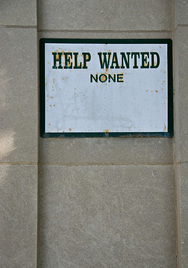
I once had a job where, in effect, I got paid to sit in the basement of an elementary school and do my best to not draw attention to myself, and you can believe me when I tell you, I did a very good job.
My employer was the City of Newton, Massachusetts. I was one of 10 people likewise organized and employed, and we were all on a mission, and our mission, as we eventually came to understand it, was to do exactly that same thing. Nothing. Sit quietly. Do nothing. Remain invisible. Get paid.
The root source of this employment was a 1970s federally funded employment initiative known as the Comprehensive Employment and Training Act, otherwise known as “CETA”. The goal of CETA was to jumpstart what was at the time a badly stalled economy, and the means it hoped to use to accomplish that goal was money. Federal money. Taxpayer money. Your money.
Though it was originally introduced during the Nixon administration, CETA was essentially a product of Congressional Democrats; a last vestige of the New Deal generational philosophy that believed that no employment problem could ever be so complex that it couldn’t be solved by throwing a billion dollars at it.
The idea was to distribute those funds locally, so that local municipalities could then further redistribute those funds via qualified employment programs within their communities; programs that would, ostensibly, provide valuable career training and job experience to individuals, while in the short run providing financial assistance and economic stimulus to the struggling local economies in which those individuals lived.
A well intended gesture, no doubt, but in reality probably not a very good use of tax dollars. Or was it?
In this case, and with no shortage of irony, it came down to a job title that my fellow employees and I shared called Communications Specialist. Irony because, in truth, none of us had any actual professional experience that could qualify us to be titled as “specialists” in anything; something we proved definitively when after 6 months of supposed effort, we failed to “communicate” anything.
...to anyone.
...ever.
Of course, what our official mission had been was something else entirely. Our official mission (which had most of us enthusiastic) was to coordinate our efforts, do some research, pool our knowledge, and jointly, specifically..., produce a simple twelve page pamphlet that would describe, list, and detail, the various municipal services available by the City of Newton to it’s residents, and how to take advantage of them. Twelve pages. Ten people. Describe services. Seemingly a very simple, achievable goal.
But not.
Very quickly as a group we learned that it was probably not going to happen. The signs began to appear almost immediately.
For one thing, there was the cast of characters. It took but a few conversations between we staffers and it soon became apparent this was not a meeting of MENSA. At least half of our group exhibited some form of dysfunctional emotional behavior. One was a chronological whiner. One was a scam artist and possibly a drug dealer. One openly hated men, and another one openly hated women (which in no way diminished when a female was eventually selected as Project Manager). Two of the group were the sons of well placed city officials, and made no secret of the fact that they were just there to collect a check. One of those was for all intents and purposes, functionally illiterate, which, when you’ve been hired to research and write, tends to be a hinderance.
And then there was me. Two years out of college with a degree in communications and the only thing I had that qualified me for this job was my work experience driving a cab and scrounging for temp jobs unloading peanuts off trailer trucks in Chelsea. In this group, though, I was a rock star.
On our first day, we reported to City Hall. We were greeted by our supervisor, a genial man who was wearing a sport coat and tie and probably a pinky ring, and looked like something right out of a hybrid blend of Parks and Recreation and The Sopranos. In wildly general terms (less specific than even what I have described above), Mr. Genial outlined the task at hand. He told us how glad the City was to have us, how much faith he had in us, and how he didn’t yet have any supplies, materials, desks, telephones, schedules, or an actual space for us to work in. He was also not able to provide clarification regarding how the finished product would look or how it would get distributed. Alternatively, he was able to make us understand that virtually no official from any official city department was going to want to go officially on record as saying anything remotely specific about any specific city service being available to anyone. In other words, there was no way we were going to accomplish our goal. He then cheerfully pointed out that he was there to help, just give him a call, and oh-by-the-way, any and all editorial content we created would be thoroughly reviewed by City Hall brass so that they could “...deep-6 it if they need to.” (Wink, wink. Nudge, nudge.)
After this somewhat less than empowering presentation, we were brought in to meet the man who was the Mayor of Newton at the time, Theodore Mann. I remember that Mayor Mann was cordial and gracious and provided what was undoubtably the high point of the entire employment experience. Once we left his presence, however, things pretty much went all downhill.
For the next couple of weeks we drifted around town as City Hall orphans; no place to go, nothing to do. We took a field trip to the library. Our minder organized a visit to a local historic homestead. At one point, to keep us busy we were given a couple of snow shovels and told to go walk around the neighborhood and dig out fire hydrants. We hung around conference rooms and hallways. We came in late, took long lunches, and left early. In short time we started functioning like every negative city worker stereotype you’ve ever imagined. For the first couple of weeks, we did a very lot of very little.
Eventually we were given a home; An unused cafeteria space in the basement of the Countryside Elementary School in Newton Highlands, a dimly lit space full of lunch tables, complete with an adjoining boiler room and a separate basement entrance so we could come and go without traumatizing the children. This became our home base for hiding. After a while we were given an old beat up red IBM Selectric typewriter and a nicotine stained telephone that had probably been purchased during the Eisenhower administration, and we went to work.
But the work lead nowhere. No one wanted to work with us. No one wanted to talk to us. No one wanted to go on the record. No one wanted to commit to anything. Try as we did, no one we reached out to, willingly ever reached back.
After a while, mostly by default, I inherited the job of editing everyone else’s work. But because much of the material was being prepared by people with the writing skills of a brain damaged third grader, even that became a challenge. I divided up the research and tried to stretch the usable material we were able to gather, into coherent rational paragraphs long enough to fill just 1/2 or 3/4 of each of the 12 pages that were our goals. It took a lot of stretching.
Eventually the inevitability of reality caught up with us, and the project slowly withered away. By late spring it was clear to all of us that our mission had become, or perhaps had always been, an illusion. We’d show up, make an appearance, perhaps hang around for a while to socialize, then disappear. The typewriter sat idle. Our scam artist stole the nicotine phone and set up shop in the boiler room, where he spent hours making and taking personal calls, about what, the rest of us never knew.
In the end I seem to recall that some rough form of a pamphlet was eventually turned in for publication, but to my recollection, it never saw the light of day. Perhaps someday, some future historian will uncover a copy and learn to his amazement that in 1978, Newton residents were entitled to have snow, trash, storm debris, and the occasional dead animal, removed from their streets. If you were to scour the deep deep recesses of filed away City Hall archives, perhaps you could find a copy too. Let me know if you do. It’s a classic.
As to the net return value of the CETA enterprise, that is something hard to defend, for sure. Six months of salaries with nothing to show didn’t make a lot of sense then, and would not make a lot of sense now. In today’s economic climate especially, with it’s soaring deficits and crushing debts, it would make even less. So, not surprisingly, as a matter of policy, a program as poorly administered and inefficiently wasteful as CETA is not something any reasoned person would ever recommend be repeated.
But that would be pure bean counting, and that would also be unfair. The actual value calculation of CETA can only partially be defined by it’s numbers. The other measurement of that value was in it’s spirit. At least to me.
For me, a CETA job was a lifeline, a helping hand, and I was grateful to have it. Before my CETA hiring, doing odd jobs and day labor, I’d been struggling to keep my head above water in a deep recession, while trying to get a foothold in an industry (video production) that had potential, but was only then just starting to mature into a viable field of employment. My memories of those days are of frustration and discouragement, and occasionally, despair. I remember on many occasions trying to keep the lights on, ducking the landlord, kiting checks and going to a cupboard that had little edible in it beyond a jar of Tang. I remember scraping together a handful of pennies to buy a single can of beef stew, and then being humiliated by the convenience store clerk who couldn’t be bothered to count them, and refused to take them, leaving me embarrassed and hungry. Those days taught me, a snot nosed kid from the suburbs, a few lessons about humility and how lucky I was to at least have an education and a sliver of hope.
And then CETA came along and gave me something equally important; a little extra time and and a little taste of dignity.
Having a few bucks in my pocket and a reason for getting up in the morning...having a job...made a difference. It gave me breather and a chance to get up on my feet, get my bearings, get my confidence back, and keep trying. It wasn’t perfect, it wasn’t a solution, and it wasn’t charity, it was support. And at the time, it was exactly what I needed.
In time, that economy rebounded, and the industry I had chosen began to expand and prosper. With work and persistence, and a little more luck, I was able to carve out a career in it, earn a living, raise a family, buy a house, and oh yeah, pay my fair share of taxes.
And while I would never encourage the sort of reckless free spending pattern that programs like CETA have symbolically come to represent...I will also never forget that there are times when people just need help...a little compassion and a little help, so that eventually they can help themselves.
And that when my time came to look for that help, I was glad, and grateful,
...that it was there.

 RSS Feed
RSS Feed